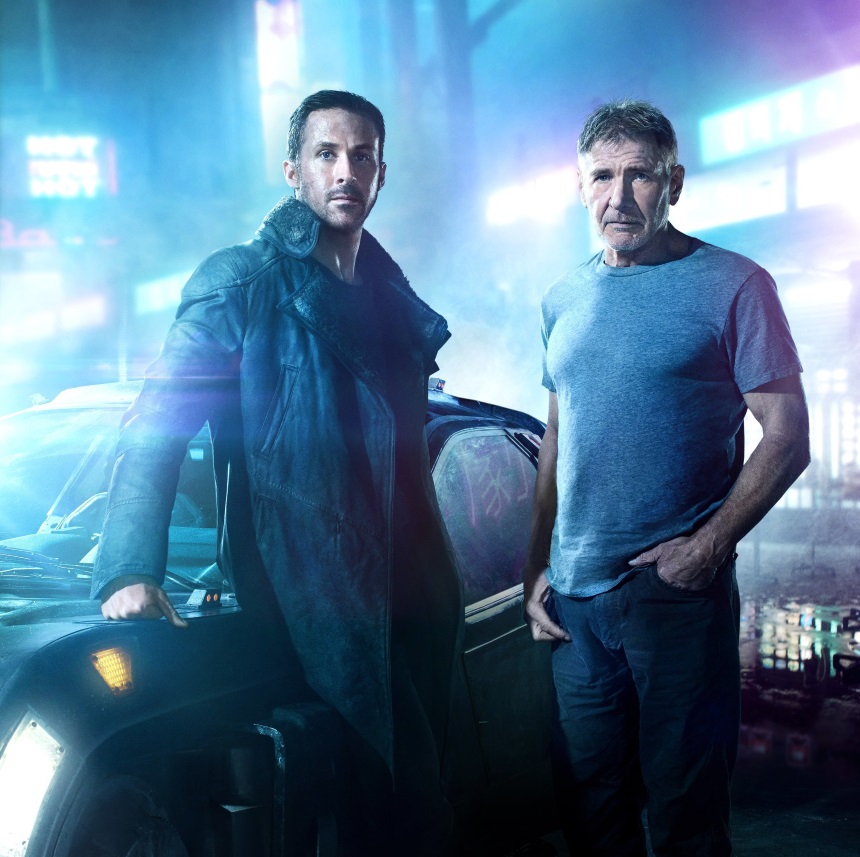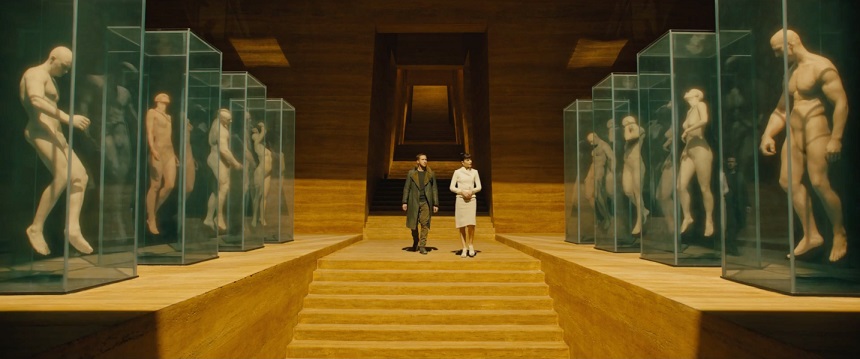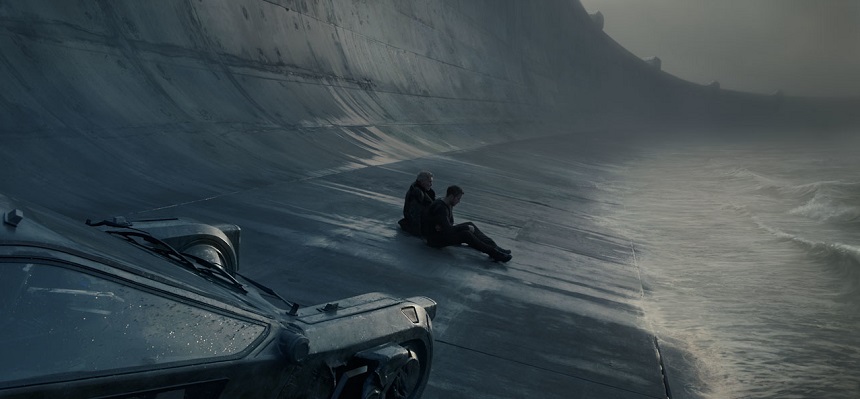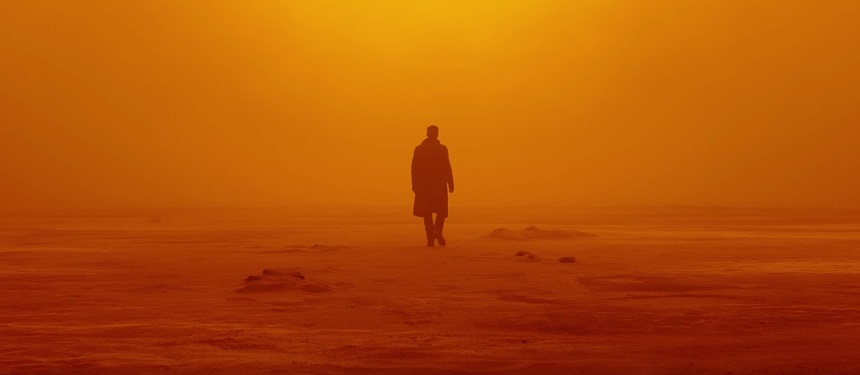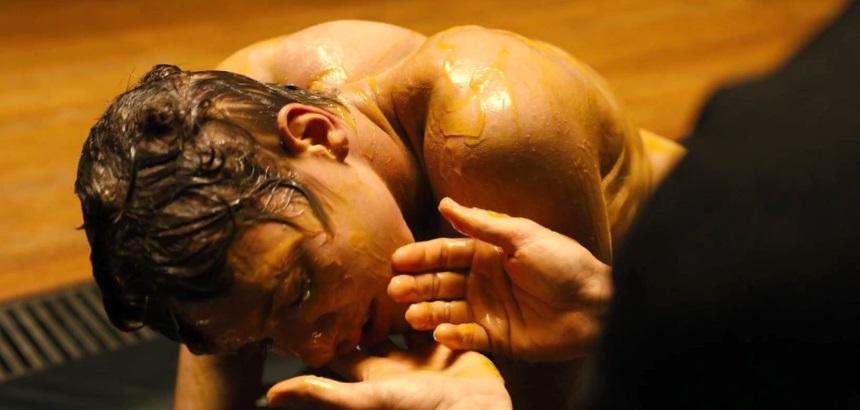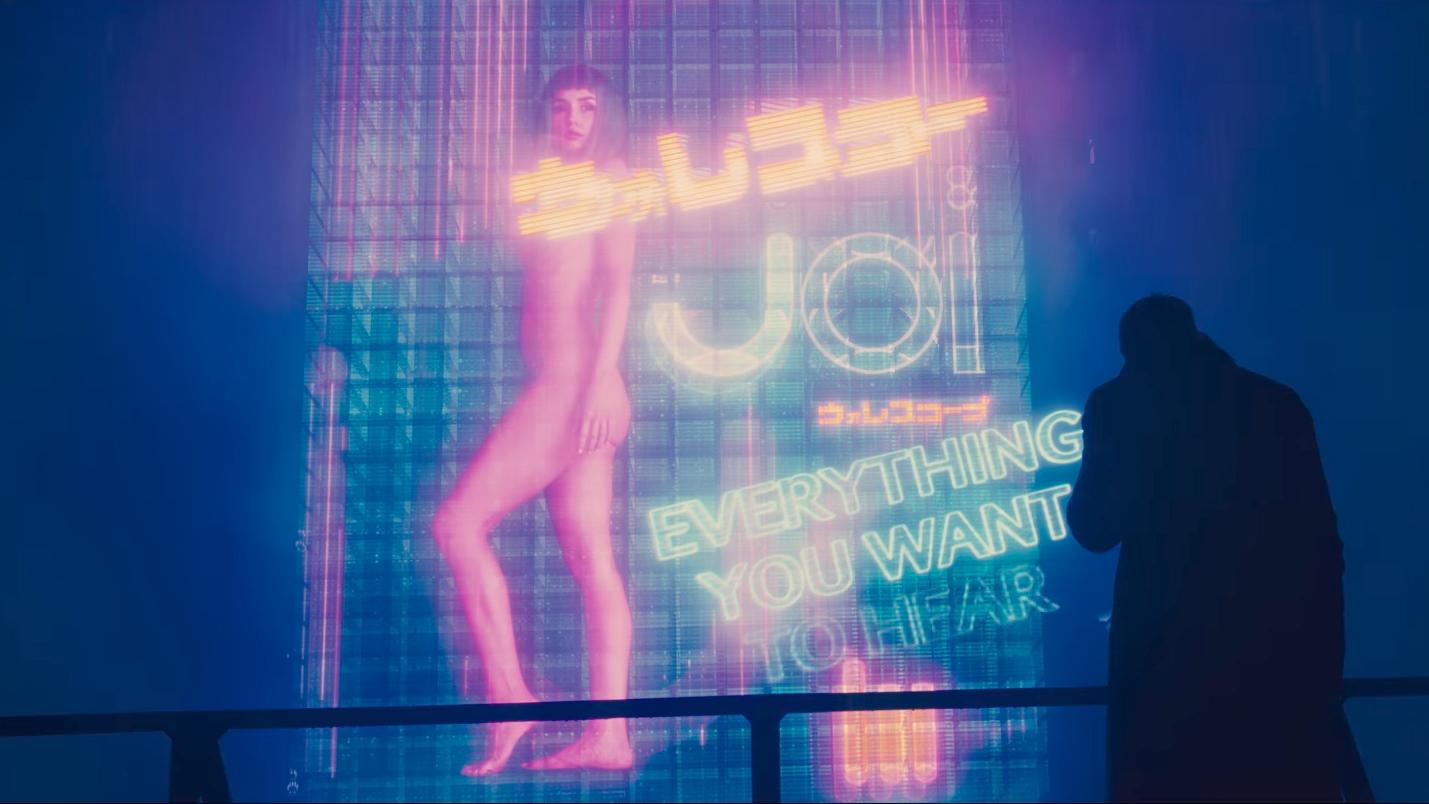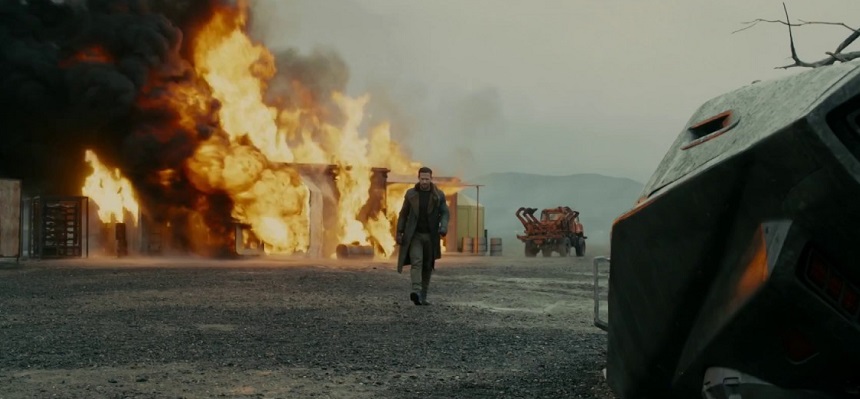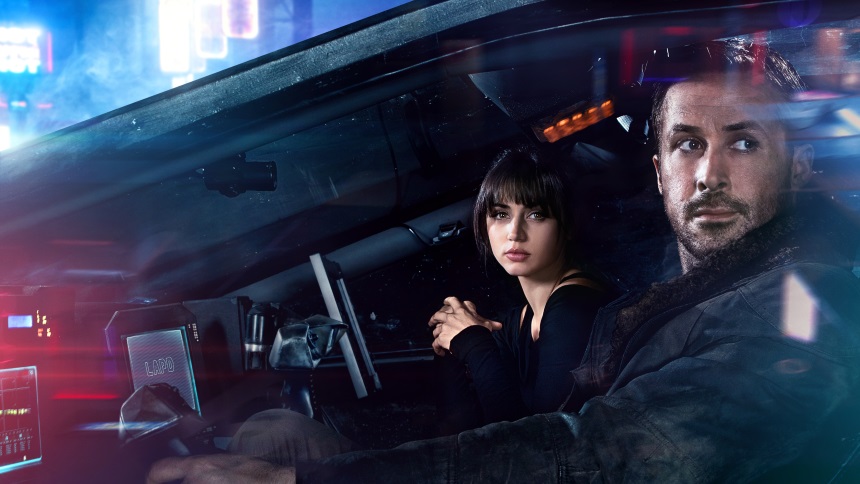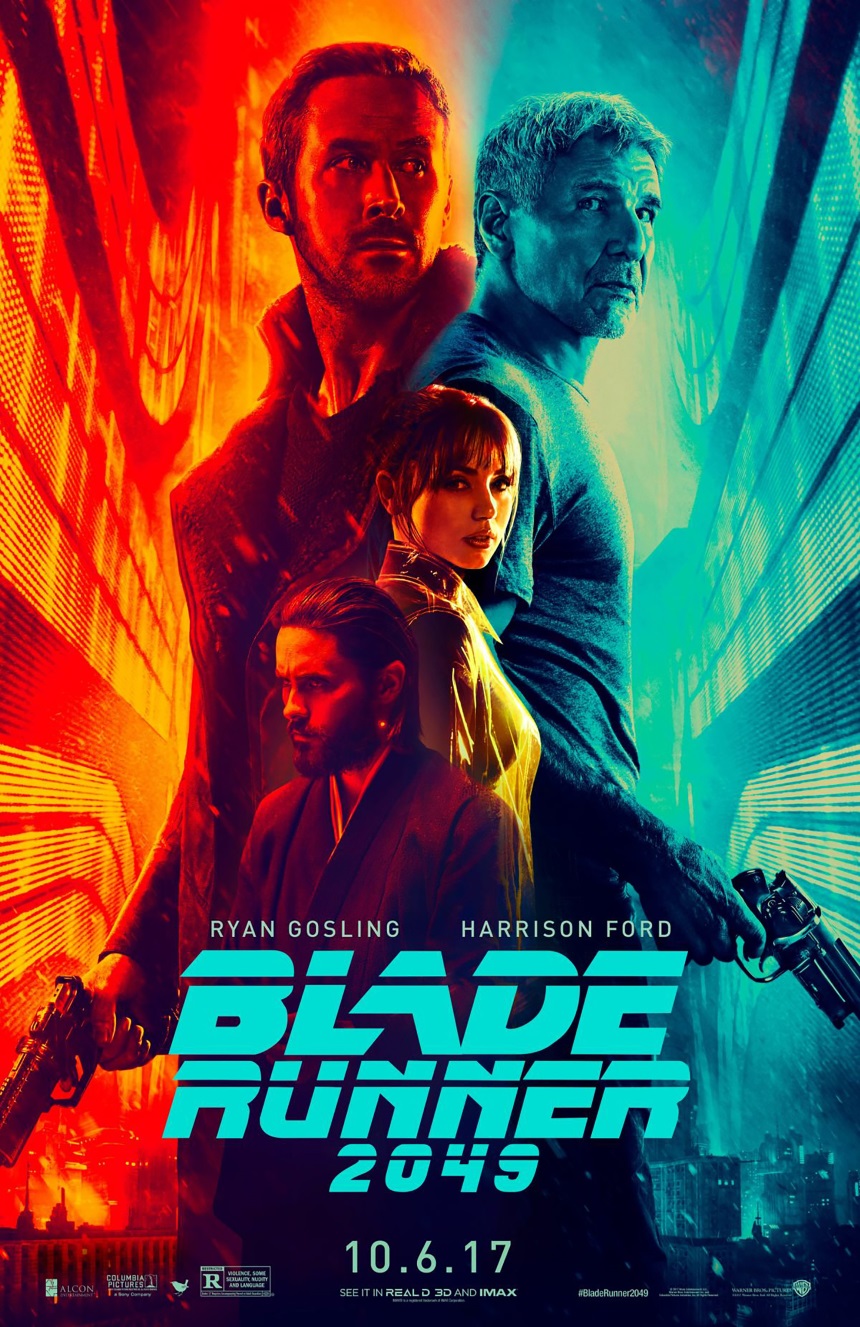
We almost didn't publish a "Screen Anarchists On BLADE RUNNER 2049" article. I did a quick tally among our editors, critics and contributors, and everybody seemed to like the film. Now that ain't interesting, is it? We want divisiveness in this category!
Thing is, a few days later everybody was still talking about it. And when I saw the film myself, I couldn't shut up either. People weren't talking about the same subjects, and when they did, they often didn't agree. A few were gobsmacked by how awesome they thought it was. A few dismissed the film as pretty, and not too bad. Stuart Muller saw both Blade Runner and Blade Runner 2049, both in a cinema, for the first time of his life, and within 24 hours. Boy, am I jealous of him (do read his story)!
So... hmm. There still is divisiveness, so let's do an article anyway: here is another round-up of our opinions!
Jim Tudor wrote our official review, a few weeks back, and therefore we start with him.
But note that your opinion is valid as well of course, so chime in, in the comments below, and HAVE YOUR SAY!
Jim Tudor, Peter Martin, Dustin Chang, Ernesto Zelaya Miñano, James Marsh, Christopher Webster, Kurt Halfyard, Sean Smithson and Stuart Muller
contributed to this story.











If the original Blade Runner has been looked upon as a prime example of postmodern soul searching with a dash of relativism, then how to classify 2049, a sequel that is bigger/everything/more! than its precursor but also, at long last, a quality bookend? Even if the new film doesn't send viewers away with an impossible list of engagingly ponderous questions, it stirs the existing pot as well as anyone could hope, and leaves audiences fat and happy on its own particular aesthetic world building and a dour presupposition of tomorrow's U.S. West Coast.
Most years-after-the-fact sequels tend to ultimately flail in the shadow of their originals, usually becoming pesky little footnotes. (See Tron: Legacy or Texasville). Blade Runner 2049 has a better shot at canonization than most. It asks the big questions, maintains the genre-mashing tone established by Scott, and directly revisits bits and pieces from Blade Runner. It's a film for the here and now, in that it projects the question about which lives truly matter in a culture built on overt consumption and blatant exploitation.
Despite minor criticisms (and all of my criticisms are indeed minor), Villeneuve has delivered what is an undeniable visual and aural smorgasbord, something that absolutely must be experienced cinematically, and without distraction. That the latter comment must follow the former is its own sad commentary on mankind. The lonely architecture, the perpetual landscape of video walls, the persistent background droning sounds, the hum of Hans Zimmer's score, the arbitrary colors popping through it all ... it's a beautiful nightmare of a possible future, one not all that far off.
(Excerpts from Jim's full review.
Also, you can hear Jim and friends discuss the film for over 90 minutes on his YouTube show for the site ZekeFilm here).
A magnificent, enveloping experience, Blade Runner 2049 is truly gorgeous to behold. Even better, a river of rich melancholy runs throughout the film.
As with Ridley Scott's Blade Runner, and most detective stories, for that matter, the characters and the world in which they live become far more fascinating than the mystery itself. As a replicant, K has a computer-generated girlfriend named Joi (Ana de Armas) who acts more traditionally human than he does, displaying a wider range of emotions.
Gosling and de Armas are the emotional center of the film, even though we’re constantly aware it’s not a real relationship, but an idealized one that starts with Joi resembling a fabulously dressed and perfectly coiffed 1950s American housewife. The two actors have great on-screen chemistry, a balance of warm support and chilly precision that rings familiar bells.
Blade Runner 2049 looks quite differently, most of the time, than Blade Runner, yet the deliberate pace is deliberately reminiscent. Still, the new film features more action and somehow feels more urgent; it’s similar, but markedly different, too, which makes it all the more rewarding.
Few sequels have topped the original, but Blade Runner 2049 does that and more: it inspires contemplation and hope, even for a dying future world. It may be the best film of the year.
[Full disclosure: Blade Runner the original is one of my absolute favorites of all time. For me, nothing before or after really tops the beauty of the rain soaked, neon-lit, melancholic dystopian future imagined and realized by Ridley Scott and Co. in 1982.]
So arrives the sequel nobody asked. Why touch the classic? Why must Hollywood ruin everything? So I had a lot of pre-hate going in Blade Runner 2049. And not surprisingly, it turns out to be whole lotta nothing. The sequel provides nothing but eye candy for 3 hours running time. And it's not a bad thing per se.
"Things were simpler back then," This remark rings extremely hollow considering how thin the plot of 2049 is. Officer K is supposedly hated because he is a replicant but this is never demonstrated other than a shoulder slam with a name calling- "skinjob!" by a random jocky cop at the police station. K's only companion is a hologram AI girlfriend Joi (Ana de Armas) who takes up an inappropriate amount of running time. Replicant needs a hologram companion? Why? Why does he even need an apartment? A worldwide blackout happened and erased most records - this information is completely context free, so is the post-nuked Las Vegas. Then there is a thin subplot about the replicant revolution. They also want to kill Deckard by some erroneous, fuzzy logic. All these don't hold up to much. To wrap it all up, K is like Roy Batty, trying to do things right, at the end.
There are a lot of things lacking in 2049. The action sequences lack the iconic, operatic dances of death of the original. Jared Leto is supposed to be an enigmatic creator, destroyer Wallace. But he lacks just that, enigma. Female characters, except Robin Wright and Mackenzie Davis (both of whom are unfortunately underused) don't resemble the athletic, cold hard 'beauty and the beast' killing machines of the original.
Thankfully, its somber mood, rather ineffective plot, minimal exposition and not too noticeable soundtrack (thank goodness Hans Zimmer restrained himself) don't even try to compete with Roger Deakins's stunning recreation of the look of the original and more. At the end of the day, the prettiness of the glorious images wins over all else. 2049 is destined to get regular playtime on my TV screen in the near future every time I want something pretty on in the background as I do house chores.
Ernesto Zelaya Miñano, Contributor
Once an artificial being becomes “human” and starts thinking like one, what’s next? You’ve been told what to do for most of your existence, and all of a sudden, you’re on your own; now you have to discover your purpose, find your place in the world. That’s what every character in Blade Runner 2049 seems to be doing, even the very human Rick Deckard.
This film is then an extension of the intriguing ideas the first movie had about artificial lifeforms, but taken to their next logical step (or extremes in the case of Ana de Armas’ character, who could never conceivably pass for human); thirty plus years later, the Replicants are evolving, and so this does what any good sequel should and expand on what came before, rather than simply repeat itself.
For once, crotchety old bastard Harrison Ford seems really invested in the role. Deckard is now lonely and burned out, and the resolution of his story gives this movie the emotional core its more cerebral forebearer didn’t have. Meanwhile, Ryan Gosling’s sometimes robotic acting style is put to good use.
Any science fiction worth its salt is one that makes you think, and Blade Runner 2049 has some great concepts up its sleeve. Denis Villeneuve has released one movie a year for the past four and he hits it out of the park once again, with a huge assist from Roger Deakins. Great sci-fi, a worthy follow-up, a movie worthy of discussion and one that is also destined to become a cult classic in the future.
Villeneuve achieves the near-impossible task of taking a project literally nobody was asking for and transforming it into an indispensable experience that complements and enhances its predecessor. Resisting the temptation to simply rehash the same themes, aesthetics and narrative arcs as Ridley Scott’s seminal Blade Runner, Villeneuve instead imagines how the world might have evolved after 30 years, how technologies we recognise have advanced, and how a replicant can indeed dream of something more. A masterclass in visual and aural storytelling, a wholly immersive sci-fi wonderland, and a deliberate pace that is wholly in tune both with the director’s strength and Ryan Gosling’s particular brand of minimalist emoting. The supporting cast includes a roster of incredible actresses such as Robin Wright, Sylvia Hoeks, Carla Juri, Mackenzie Davis, in addition to a wholly engaging turn from Harrison Ford, but it's the wonderful Ana de Armas who steals the show. That a replicant and a hologram can muster one of the year’s most human endearing relationships is further testament to what an incredible piece of work Blade Runner 2049 truly is. Add to that Roger Deakins’ mesmerising cinematography, a hypnotic score from Benjamin Wallfisch and Hans Zimmer and you have, without a doubt, my favourite movie of the year so far.
Christopher Webster, Contributing Writer
Blade Runner 2049 announces itself with such scope and fury that it left me virtually speechless by moment one. A mainstream film driven by ideas before plot, mood before set-pieces, it joins the ranks of the very best cerebral science fiction cinema and makes Arrival look like an inmate indie by comparison.
This is no fan film, no nostalgia trip. Shades of the American New Wave haunt the film as original writers Hampton Fancher and David Webb Peoples return to create a true sequel to Scott's original that adds many new ideas. A whole new layer of simulacra has invaded a world that seems to have dropped even deeper down the rabbit hole of post-human evolution. There are twists and turns to the story, and some retconning to make it all work, but the revelations are not merely intended to shock or titillate. Rather it's all in service of a conversation about the condition of conscious . Who am I? What is my story? What is our story? Who are we?
Kurt Halfyard, Contributing Writer
It Is Always Snowing In Los Angeles.
I wish that were the title of the film, but it is as if to say that each replicant, including Ryan Gosling's Joe K., Rick Deckard's aging human (the new film keeps the originals quasi-ambiguous stance), or virtual software entity are all unique snowflakes blowing around in an high tech urban sprawl.
An even better image is a Russian-Korean Automat that Officer K. visits for noodles: Make your selection, window pops open, grab and go. Blade Runner 2049 is a handsome sequel, but more or less a simulacrum. The memories of the future feel created and assembled in a sterile facility for selection and consumption for busy passers-by in the multiplex. It might be a bit more challenging than your regular popcorn films, but it is still comfortably in that space.
"I hope you don't mind me taking the liberty. I was careful not to carry in any dirt." The first line of dialogue has a tentative tone that is quiet and respectful of the classic 1982 science fiction meditation on what is human. Cinematographer Roger Deakins, and one of the original films screenwriters, Hampton Fancher may have delivered a visually opulent and immersive spectacle as the original, 2049 one suffers from being too prosaic and plot heavy to capture the mystery and magic.
The poetry is muted.
From a futurism of view, Denis Villeneuve's film feels more like a sequel to Steven Spielberg's A.I. or Spike Jonze's Her. Notably, the Wallace Corporation (a bigger version of the Tyrell corporation) designed virtual companion Joi, here played by Cuban beauty Ana de Armas, is more compelling than the Roy-Batty-as-an-executive-assistant, Luv, despite some wicked martial arts moves on the part of Sylvia Hoeks.
In fact, a replicant finding relaxation and love at the end of the day with piece of quasi-sentient software is the best part of the film. And yet, that element feels often as mere aside to the 'solve the mystery,' game that Villeneuve seems to be consigned to follow. The director, on paper, felt right for the job, but his favouring plotting reveals over ecstatic truth feels like a bit of a crime and a lot of a letdown. This occurred far more with his recent film Arrival than what I loved about Enemy, and even Prisoners. Sicario remains his masterpiece.
Echoes and callbacks to the original Blade Runner vacillate between pandering and substitution. The endless flame-belching manufacturing hellscape opening is swapped in with clean, sterile, solar farms. The Bradbury building is now a colossal Las Vegas hotel. The production design is impeccable and modern, and I am thrilled to see cyberpunk make a comeback 2017.
Science fiction ideas are an extrapolation of now (algorithms and post-capitalism), just as Blade Runner was an extrapolation then, the early 1980s neon and microchips. This is good.
But something, I suspect it is the 'object finding quest' of today's blockbuster narrative requirements, prevents the film from soaring. It is not weird or unsettling enough. Where the original was content to live and work in the world, with story emerging slowly organically from characters doing their jobs in a believable manner, the new one has to 'blow up the world,' as Robin's Wright's feminine take on M. Emmet Walsh's LAPD desk-jockey ominously intones.
Despite being central to the story, Harrison Ford's Rick Deckard is often a prop in terms of character. His best line of dialogue is for Officer K. to ask his dog the questions, he isn't interested in answering. Thus, for me, the ending lacks resonance or melanchol. It simply 'is.'
I walked out while the credits rolled entertained, certainly; visually impressed, definitely; but not emotionally enlightened. The new film is a solid effort ("You've done a man's job, sir!) but not more Blade Runner than Blade Runner.
Sean Smithson, Contributing Writer
Alleviated from coming off like a sequel due to a quarter century lapse between the first film and the current one, twenty-five years to be exact, and by having an almost entirely different cast, Blade Runner 2049 (BR2049) is a valid continuation, not a rehash with diminishing returns.
Like Aliens, The Empire Strikes Back, or even more fittingly, The Godfather Part II, BR2049 cracks its universe open even wider, without sacrificing anything for scope. And the scope here is huge.
I'll refrain from shoe-horning in a mini plot breakdown here, and go right to how BR2049 made me react, and what it made me re-call, as a theater-goer who sometimes feels semi-starved.
One word could really do it.
Hallelujah!
Putting a finer point on it however, is 2017 quietly being a seminal year for Amrican cinema? Maybe. First, in the more commercial end of genre, we have both Get Out and Wonder Woman, two films the studio systems were concerned about working demographically. Well, we know what happened there. Horror films centering on people of color, and a superhero film featuring a "girl" (read: woman dammit) both destroyed box office records, and proved that audiences absolutely will embrace a wider spectrum of protagonists and heroes.
Then along comes Darren Aranofsky's mother!, which threw a film that could have been made by Bunuel, Jodorosky, or Polanski, out onto multiplex screens, that challenged, and often (haha!) confused it's audience. Hence a lot of the more commercial-minded "geek" sites crucifying it. Happily, for me, mother! was a signal flashing in the dark, promising that surrealistic, existential, intellectually minded films were not completely extinct as far as the theater experience.
I was fearful of BR2049 though. Going as far as to say online that I predicted something "not so great". All my hopes laid on Denis Villeneuve, whose past work I loved, but he wouldn't have been the first extraordinary artist compromised by a studio franchise.
Fears were pretty much unfounded though, and hope was met with relief. BR2049, while not easy to unpack and I am still futzing with those mental boxes, is a sprawling, intensely meticulous, ever expanding web, that absolutely warrants it's long runtime. The easiest way to contextualize BR2049 in such a short space is to show some of the connective tissue I'm seeing, in regards to other works.
As where the first film was more intimate, reminding me of films like ,b>Laura, or The Woman in the Window, BR2049's expansion shows a much larger world, both narratively and mythogically, which brings to mind works like All the President's Men, or even more fittingly, Chinatown.
Visually, maestro cinematographer Roger Deakins raises things to the level of a Lawrence of Arabia (for which cinematographer Freddie Young won the Oscar in 1963...can Deakins be far behind?), as well as retaining a lot of the style of Jordan Croneweth's work on the first film, which absolutely helps to cradle us comfortably from Ridley Scott's original vision, into Villeneuve's current take on the world.
Philip K. Dick was apparently very happy with what he saw of Scott's Blade Runner. Something tells me if he were around to see Blade Runner 2049, he'd be smiling once again.
Maybe even wider.
Stuart Muller, Contributing Writer
I had never seen Blade Runner - the original - until the night before I saw Blade Runner 2049. It was just one of those classics that I missed growing up in South Africa, with no video machine nor even a movie channel. I've not avoided it, but it was a big deal movie that seemed to demand an occasion, which just never seemed to materialize. That is, until I saw that the director's cut had been remastered and remixed and would be screened in a local Dolby Atmos theater for one night only. Finally, the occasion had arrived: an opportunity to see Blade Runner right - big and bold - the very first time. It surpassed all my expectations.
I still find it revelatory to see Harrison Ford when he was so young - I also missed the Indy and Star Wars movies until I was quite a bit older (for context, The Fugitive is my earliest strong Ford memory). Discovering that Blade Runner also contained a young E.B. Farnum from Deadwood (William Sanderson) was an Easter egg of particular delight, but frankly every role was a mesmerizing discovery - Sean Young, Daryl Hannah, Rutger Hauer in full-on Adonis mode... This film was a joy to behold, and that's without even discussing the story itself, the cinematography and music (and remastering and remixing of both!), and the deep questions that percolated in its wake. In fact, I must admit that I was so enthralled it never even occurred to me that Deckard might be a replicant until post-viewing discussions ensued.
To follow that experience with Blade Runner 2049 a mere 24 hours later has I think given me an unusual perspective on these films - I don't see them as separate films, but as two chapters of one film, because that's pretty much what I experienced. I thought the flow and continuity between films was sublime, and the calibre of performance in all aspects of the sequel more than met the extraordinary precedent set by the original. Thematically, the pair of films beautifully bookend the questions of humanity at the heart of this grand tale, and indeed it seems to me now that Blade Runner feels thematically incomplete without it's sequel; as though only one side has been told of the story about two sides. I am, at present, entirely incapable of considering these films in isolation, but find that each is profoundly elevated by the other.
Finally, I just have to say something about the quality of the original Blade Runner I saw screened: it was the most impressive clean-up of a film that I have personally ever seen. The film was dated, but only by the predominance of physical sets and effects, and the texture of celluloid; the visual quality was extraordinary, and not once did the clarity seem obscured despite the film being so shrouded in shadow and shot at the dawn of the 80s. The sound, no doubt benefiting from a Dolby Atmos theater, was no less impressive and played a huge part in the experience. The Blade Runner I saw in 2017 could well have been made in 2017, and though the digital 2049 lacked some of the analogue original's texture, they were otherwise tangibly contiguous film experiences - a testament to both the remastering of the original and the commitment to historical aesthetics of the sequel.
The Blade Runner story has leapt to the very pinnacle of my pile, and seeing them together on the big screen has been one of the best nights at the movies for me in some time.
In the summer of 2009 we had ourselves a "best film" event here at Screen Anarchy, then still named differently, and everyone had to list his personal top eight, resulting in a list with 128 films on it. Two titles ended up sharing the top spot: Miyazaki Hayao's My Neighbor Totoro and Ridley Scott's Blade Runner. That should tell you something about how highly we valued these films: literally nothing could beat them at the time.
With that in the back of my mind, I never thought I'd see Blade Runner get a certified sequel. There was that half-linked Paul W.S. Anderson film Soldier (crashed spinners can be spotted among the garbage in that film), but does anyone think that counted? So when news arrived that Warner Brothers was actually going forward with this, more than thirty years after everyone had pilfered the cool stuff from the original already, and just as that original was finally starting to appear dated, disgust was my initial reaction.
Literally the only reason for me to have any hope for Blade Runner 2049 was the fact that Denis Villeneuve was its director. It's not that I was a huge fan of his work, but at least this choice made it unlikely that the film would end up being an action cash-grab. Tentatively I hoped for intelligence. Then early opinions came in from people I trust... and based on those I had to go see it.
When I saw it, it felt like I had entered a giant hall with only one piece of art in it. Mostly empty space, but you're drawn to that one spot. And even while in the back of your mind you think stuff like "how pretentious, how unnecessary, such a big room just for this...." you look at that single piece of art and keep thinking "regardless, that is still one beautiful piece of art". Even the film's visual themes and compositions keep reinforcing this feeling.
Also, I get the impression Villeneuve had fun with adding extra layers, as if his film is an onion. Direct references to the first Blade Runner are easy to spot, but I wager there are other things happening as well. Even the wound placements on Ryan Gosling's character seem to mirror earlier films he's become famous for, and given the part of the storyline where this gets serious, I can't help but suspect this was intentional.
Blade Runner 2049 was totally not what I expected. Yes, bits of it are dumb. But bits of it are very good, and some bits of it are positively awesome. I got a big lump in my throat at one point. Who'd have thought that would happen? Damn!

More about Screen Anarchists On
More about Have Your Say
Around the Internet
Recent Posts
Leading Voices in Global Cinema
- Peter Martin, Dallas, Texas
- Managing Editor
- Andrew Mack, Toronto, Canada
- Editor, News
- Ard Vijn, Rotterdam, The Netherlands
- Editor, Europe
- Benjamin Umstead, Los Angeles, California
- Editor, U.S.
- J Hurtado, Dallas, Texas
- Editor, U.S.
- James Marsh, Hong Kong, China
- Editor, Asia
- Michele "Izzy" Galgana, New England
- Editor, U.S.
- Ryland Aldrich, Los Angeles, California
- Editor, Festivals
- Shelagh Rowan-Legg
- Editor, Canada


